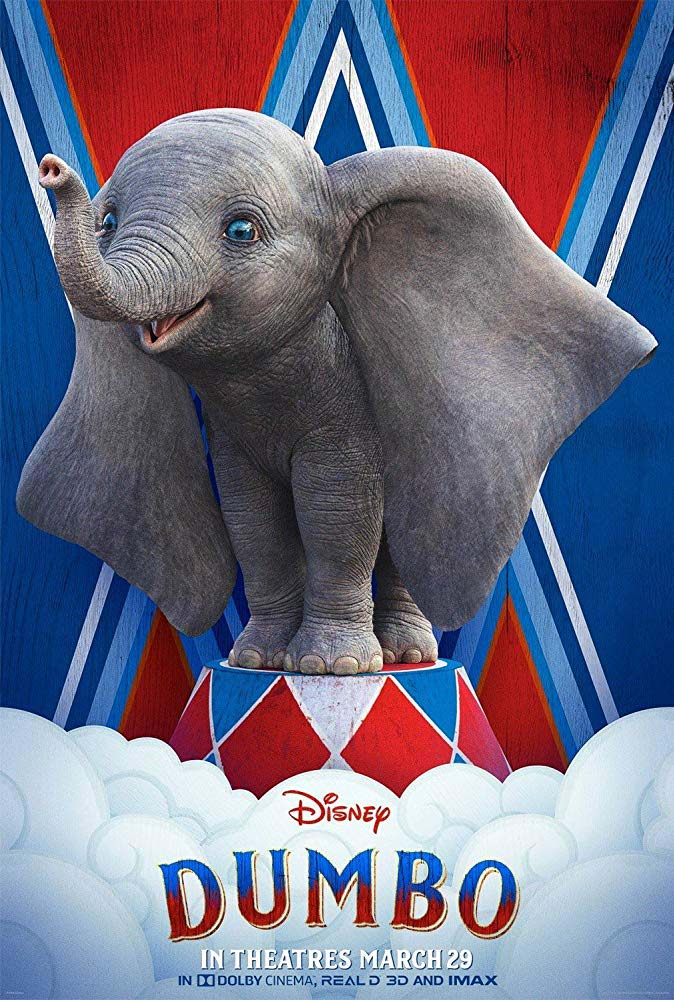
In “Dumbo,” the familiar refrains of family being paramount, love conquering all, and small creativity being more compelling than overwrought excess return. The original “Dumbo” was focussed on its animal characters. It was a steady musical, and our elephant only took off from the ground towards the end of the film. This new “Dumbo” introduces a focus on a human family. We begin at the end of World War I. Amputee Holt Farrier, a former horseback rider in the struggling Medici Circus and a recent widower, returns to the troupe, where his two children live. One of the elephants in the troupe gives birth to a calf with unusually large ears. Soon, Dumbo will reveal his flying abilities but things get complicated as his fame bring chaos to the troupe.
I’ve been generally ambivalent about Disney’s slate of live-action remakes of their animated films. The cycle feels desultory and the surest sign that the studio prefers to excavate its past, depending too much on former glories. It’s not that these live-action remakes are new. They’re not. From 1994 to 2000 we had three – “The Jungle Book,” “101 Dalmatians” and “102 Dalmatians.” Since the release of Tim Burton’s “Alice in Wonderland” in 2010, this new “Dumbo is the eighth. In just nine years. It feels excessive, especially as many of these remakes have little that defines them as significant against their originals.
“Dumbo” does not change my mind necessarily. Yet, despite the muted critical response, I find it to be the warmest and most thoughtful of the recent live-action remakes. “Dumbo” has specific things to say about showbusiness, about animal safety and cruelty, and about families. Certainly, much of this is tried and treaded from any family film in the last 50 years, but it separates itself from its contemporaries by explicitly arguing for the validity of its existence against the original film.
In fact, the complete lack of cynicism or detached irony that runs through “Dumbo” feels explicitly pointed in many ways. If the live-action exercises are symptomatic of Disney yearning for the past, “Dumbo” is intriguing for the way it owes a debt to a classic kind of family-film – for families but also about families.
To its (occasional) detriment, this emotional focus comes at the expense of any extreme visual splendour. The film looks good, but Burton (often unfairly maligned for excessive aestheticism) decides to steep the film in a sober realism than anything supernaturally excessive. It makes for a curious dynamic. A flying elephant, who seems to cultivate a preternatural knowledge of geography, is obviously hardly unrealistic. And yet, the film opts not to play this as decisive fantasy but as something rooted in the real. The gamble stumbles in some parts. The child-actors, for example, the most significant human characters, are not always up the task. But it pays off in other ways. It makes the moment of Dumbo’s flight dependent on a sincerity in a way that was unexpected for the way it moved me. Each time Dumbo soars the film is immediately more affecting and more compelling. Not for how fantastical it is, but for the way it’s built into the story as a part of its stakes.
The third act turns the film into a momentary heist film that’s predictable and still charming in that way a cover of a familiar song is. Not for its newness or profundity but for its familiarity and comfort. “Dumbo” is not exceptional but its sincerity is hard to reject. Or, in theory. It’s not been rejected by audience, but the response has been muted in a way that seems troublesome for Disney. One may think perhaps, the muted response to “Dumbo” might suggest a petering out of the Disney live-action craze. But, it’s unlikely. Later this year, live-action versions of “Aladdin” and “The Lion King” will be unveiled. Almost half a dozen other live-action remakes have been announced. Creatively, “Dumbo” feels like a congenial curio. Commercially, “Dumbo” does not even register as a hiccup. Even with the dwindling enthusiasm, it still topped the box office last weekend.
“Dumbo” suggests that, ultimately, the giant commercial conglomerate will come to ruin if it tries to engulf all in its path. It’s a sweet message that is amusing for how at odds it seems with the more ambivalent relationship between art and commerce that defines the 21st century. Like the film, the message is sweet in context, but there’s the slightest feeling of hollowness that persists when you think of it for too long. It’s not Dumbo’s fault he ends up part of a commercial masquerade. And it’s not the film’s fault that it’s part of Disney’s own cyclical parade. So, to enjoy both, we must suspend our disbelief. Is that suspension realistic? Not always. But it’s charming enough while it takes flight.
“Dumbo” is now playing at local theatres.






